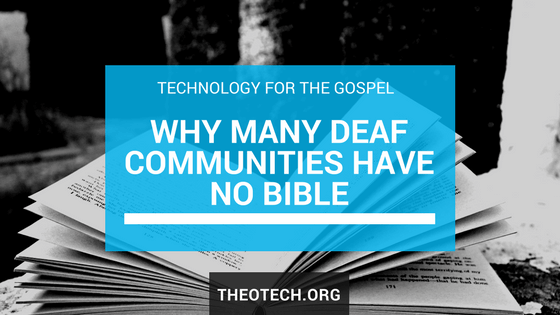Technology for the Gospel: Why Many Deaf Communities Have No Bible
by B. Douglass | January 26, 2018
If you want to read the Bible in English, you can choose from over 100 different versions. But if you’re Deaf, there is not even one fully complete version of the Bible available for you to read.
Globally, there are over 70 million Deaf, according to the World Federation of the Deaf.
“That’s a huge population of people who don’t have access to Scripture,” says J.R. Bucklew, a former missionary and president of the Deaf Bible Society. Both of Bucklew’s parents are Deaf, so he’s experienced from childhood how different the world is for people who are a part of the Deaf community.
Sign language and the Bible
American Sign Language will always be his “heart language.” It’s the first language he learned, and the one his family uses at home. For Bucklew, and much of the deaf community, English is their second language. The more hearing loss a person has, the more challenging it is to learn English, and many in the deaf community are functionally illiterate. Yet even for those who are fluent, there is still something incredibly powerful and meaningful about being able to experience God’s word, and the Gospel story, in your heart language.
We at TheoTech had the opportunity to hear Bucklew speak when he visited Seattle for Code for the Kingdom in 2015. He shared about how the Deaf Bible Society is using technology to help spread the Gospel, with videos, apps, and a variety of exciting resources.
Technology and worldwide growth
First launched in 2002, the Deaf Bible App currently gives over 600,000 users around the world free access to the Bible in 22 different sign languages. With over 350 sign languages used globally, and no version of the Bible completely translated yet, there’s still plenty of work to do. But advancements in technology are helping this work reach more and more people.
For people in the developing world, being able to have parts of the sign language Bible on micro SD cards for their phone has been revolutionary. Getting access to a DVD player and collecting various DVDs can be difficult, but many people have a basic cell phone.
We started TheoTech because we believe God can use technology and entrepreneurship to do exciting things for God’s kingdom. Christians who work in technology can use their skills, talents, and work experience to serve God and help spread the Gospel. For software engineers, using our skills as coders to make apps like Ceaseless, which sends reminders to pray for three friends each day, and spf.io, which provides in-the-moment language captions and translation for churches and events so everyone feels welcome and can understand.
In Revelation 7, God gives a vision of his future kingdom where “a great multitude that no one could count, from every nation, tribe, people and language” stands before the throne and joins in worship and praise to God. Bucklew and his team are focused on using technology to bring Scripture to those who are Deaf around the globe. With spf.io, we are working to create ways that people who speak different languages can bridge barriers and worship together.
We see technology as something God can use to bring more people to him, and draw Christians together in community. We want to live our lives, and use our jobs and skills, as a way to help partner with God in God’s powerful kingdom work.
As you are in prayer this week
Have you seen sign language in church as a part of a sermon or worship service? Do you know Christians who are Deaf? Do you know any pastors who are Deaf, or do you know about any Deaf churches near you?
As you go about your week, consider ways you can be in prayer for those in the Deaf community. Whether for Deaf Christians in the U.S. who may not always feel welcome, or be able to fully participate, in church or Christian community, or for those around the world for whom translation of the Bible into their sign language has not yet begun.
